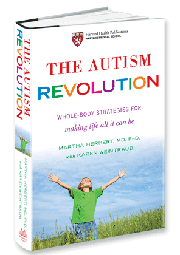EVIDENCE-BASED MEDICINE (EBM)
Evidence refers to what we draw upon to decide whether something is true or reliable.
One of the hidden difficulties with “evidence” is determining what the “something” is that we are testing. Many of the connections we make in our minds are complicated. They involve integrating many things. Our brains are good at doing this. But it is hard to test whether complex connections are “true”.
Evidence-based medicine provides assessments of treatments. For the most part it tests one treatment at a time, on groups of people who share a common diagnosis or some other common feature. Evidence-based medicine studies can identify risks and side effect.. This is very important. But it is not the only kind of evidence.
Critics of evidence-based medicine point out how many important things it cannot address. For autism these include questions like:
- What causes autism? What caused it in my child?
- (EBM is better for prediction in groups than for what is right in an individual case)
- What’s going on inside my child’s body and brain to make things the way they are?
- (EBM is about effects but not about underlying physiological mechanisms)
- What combination of treatments should we choose and in what order?
- (EBM usually addresses interventions one at a time. Studying combinations is complicated and studying individualized combinations poses huge challenges to EBM research methods)
- Is “autism” the right category to use in assessing treatments and interventions, given that it is so heterogeneous?
- More
MICHELSON (2004) However, there are two additional large classes of medical ‘events’ that are not well served by this paradigm: those that are based on physically required causality, and those that are so obvious (to the casual observer) that no self-respecting study will ever be undertaken (let alone published). Frequently, cause-and-effect relationships are so evident that they fall into both categories, and are best dealt with by the judicious use of common sense
COHEN STAVRI HERSCH 2004 The major criticisms and limitations of Evidence-Based Medicine (EBM) appearing in the literature over the past decade can be summarized and categorized into five recurring themes. The themes include: reliance on empiricism, narrow definition of evidence, lack of evidence of efficacy, limited usefulness for individual patients, and threats to the autonomy of the doctor/patient relationship. Analysis of EBM according to these themes leads to the conclusion that EBM can be a useful tool, but has severe drawbacks when used in isolation in the practice of individual patient care.


